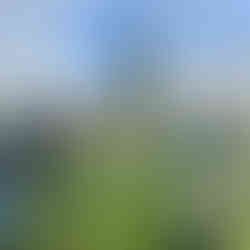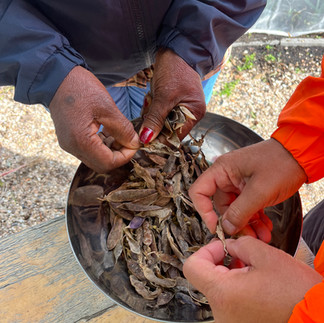Workshop about Seed Saving and preparing for winter
- Kim Hemmes
- 14 okt 2025
- 3 minuten om te lezen
Bijgewerkt op: 16 okt 2025
The summer is at its end, still we are harvesting abundantly from the garden. Yet the change in seasons is visible, with heavy rainfall, strong wind and declining temperatures, indicating that autumn is coming. With the change of the seasons, we need to prepare ourselves and the garden for the winter that is coming. In doing so and as part of the education trajectory at the farm, we followed the workshop “From autumn to winter in the garden & seed saving” by Ann Doherty, a well-known farmer in Amsterdam. The organization of this workshop is crucial for knowledge exchange among our participants, since we believe that they also hold a lot of knowledge and experience. Whilst new information contributes towards the increase of knowledge, which can directly be applied on the farm.

The workshop started with a presentation in the shack about the different autumn and winter crops that can be grown during the colder weather. With examples such as arugula, tatsoi, mustard leaf, and spinach. For other vegetables it is important to use some form of protection to protect both the plants and the soil against frost. For example, with a greenhouse, like the one we have on the farm, allowing us to extend the growing season and continue to grow food even in winter. We learnt that despite the limited number of crops that can be grown in winter that there are many advantages to growing food during the cold season. For example, fewer diseases and pests, and less water is required. Whilst some starchy crops such as cabbage, beets and carrots even become sweeter due to the freezing temperatures. Earlier, during the introduction round, one of our participants, Brian from Uganda, mentioned that the cabbage is his favorite crop, “because it is the plant that made me fall in love with agriculture”.
The workshop continued with information about collecting our own seeds for the next growing season. Ann started by making us aware of the declining seed variety per crop. For example, over a century’s time, the over 300 corn varieties declined to only 12 types by 1983. Because of this, she also emphasizes that “the art of selecting and propagating the strongest plants is becoming forgotten”. According to her, having a diversity of plants that are adapted to our own climate is vital. This is because these seeds became resilient within the local context, whereby seeds can be selected based on characteristics such as taste, color, size, etc. McDonald from Nigeria, concludes that “seeds are fundamental for life, even for humankind”.
During the second part of workshop, we wandered in two groups in the garden in search of seeds that we can already collect for next year. One group went to search with Hanno, the garden supervisor, and went to the maize field. Eugene suggested, “to save the corn seeds we leave the maize dry on the corn”. By doing the latter, Ann adds that “the plant is given the opportunity to transfer all its genetic information to the seeds”. The second group went with Ann, and they looked at the different ways the seeds from different crops can be collected. For example, the cloves of garlic are saved and replanted, whilst for tomatoes it is the seeds inside the ripe fruit that are collected and then dried. Lastly, we were made aware that for seed saving it’s important to work with open pollinated seeds, which are either self-pollinating or crossed in nature, and with the proper techniques will produce the same crops next year. So, we should not select F1 hybrid seeds, given that crops’ characteristics may differ in the following year when harvesting the seeds. Overall, Ann’s workshop was very insightful, and we are looking forward to applying the knowledge on the farm. And most importantly to start building our own diverse seedbank with seeds that are well adapted to our farm’s climate amidst the changing climate.
Patience from Nigeria concludes by saying that “the workshops help us to increase our knowledge about the garden and get a better understanding on how to care for it".
Omnia van Straalen - Nkouka
Projectondersteuner Project Voedsel Verhaal









